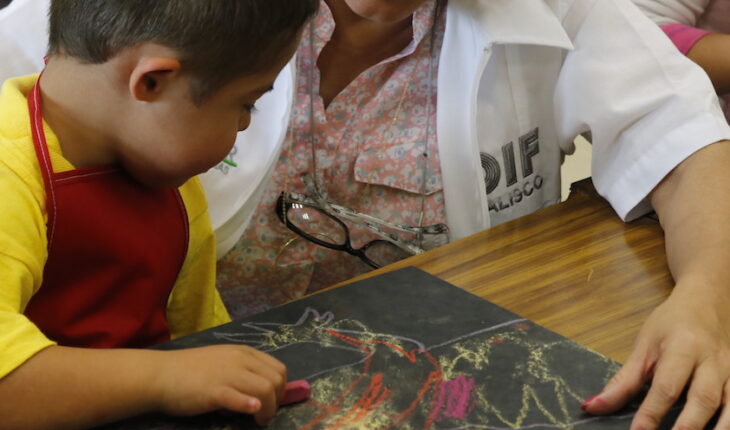Buzz is a child with Down syndrome. He is not called that, but his mother, Delia Ortiz, asks to protect his identity. So for this report, the name of the favorite superhero of the eight-year-old boy is chosen: Buzz Lightyear, the character of Toy Story that made famous the phrase: “To infinity… and beyond!”
Precisely, Delia says that this phrase is the one that best defines her son. “He’s a super active kid; she loves to run, swim, climb, and tries hard to do everything other children do. That’s why Buzz Lightyear’s phrase defines it very well,” the woman emphasizes. Because for my son there are no limits.”
However, the society around him does not see things the same way.
“You don’t know how many times I hear comments like, ‘No, this isn’t the school your child needs.’ No, it’s that we don’t have the qualified staff to take care of it…'”, laments the woman.
In late 2019, Buzz was the victim of another act of discrimination. Although this time it was not a veiled comment, Delia denounces, but a direct discrimination by the Banorte Insurer, a company with which she initiated a legal dispute at the end of 2019 after it denied the renewal of the medical expenses policy to her son.
More than two years later, the dispute is still in force, although prior to the publication of this report and after they were sought to know their version of this report, Banorte contacted Delia to negotiate the renewal of Buzz’s policy. However, the woman points out that, beyond her particular case, the central point of her request is that the bank review its internal processes to avoid other possible cases of discrimination such as the one she denounces that her son suffered.
Buzz’s case
In an interview, Delia explains that, when Buzz and her twin sister were born, she included them in a collective medical expenses policy with that insurer. Back then, he handed over all the medical documentation and had no problem. But when the child was six years old, Delia wanted to migrate from a collective policy to an individual one, and that’s when the nightmare began.
“Since I already had her insurance from birth, the move to an individual policy seemed like a simple procedure,” says the woman.
But it didn’t. A sales executive emailed him that the insurer required much more information about her son’s condition.
Delia turned over Buzz’s medical record and karyotype, the genomic study that says he was born with an extra chromosome — a condition also known as Trisomy 21. And soon after, the insurer replied in a line by email that it would not renew the policy.
“The application is rejected because the applicant presents unfavorable characteristics suggestive of aggravation of risk,” the insurer reported.
Although he did not explicitly mention Down Syndrome as the reason why he refused to renew the insurance policy, for Delia it is very clear that the reason was that, since the answer was given after delivering the karyotype and the clinical studies related to Down Syndrome.
So, from this answer, Delia went to justice.
The road was not easy. In the first place, the judicial authority did not want to accept the indirect amparo filed by Delia, claiming that this legal tool does not apply against an insurer, because it is a private company, an individual, and not an entity of the Mexican State.
However, in March 2021, the Supreme Court of Justice of the Nation had already discussed this issue following another amparo filed by Gabriel, a 37-year-old man who also went to court before the refusal of another insurer to include his baby with Down Syndrome in the policy.
After bringing the case, the First Chamber of the Supreme Court ruled that a district court should admit Gabriel’s application for amparo, considering that the insurers, although they are private, provide health services that correspond to the State to provide, and that, therefore, they can be subject to an amparo trial in the face of a disagreement of the citizenship.
In addition, with this resolution, the Supreme Court reminded insurers that they must comply with the broad regulations in force that protect the rights of people with disabilities in Mexico, such as the Constitution itself, which prohibits discrimination, the General Law for the Inclusion of Persons with Disabilities or the Law to Prevent and Eliminate Discrimination.
“It was a historic decision,” Gabriel said in an interview.
After Delia’s amparo was also accepted, a collegiate court issued a ruling in September 2021, in which basáHe tells the insurer that the reason for denying Buzz insurance cannot be disability status.
Based on this resolution, the insurer replied that, derived from the precautionary measures that the justice ruled to protect Buzz during the duration of the litigation, it had already issued the policies for the years 2020 and 2021, and that, therefore, it concluded the matter.
Then, Delia says that, before all the parties closed the case, she contacted the insurer again by email to request the renewal of the policy for this 2022. “But the answer was, ‘Cry, cry, cry…,'” says the woman, mimicking the sound of crickets in the middle of the silence. No one gave me an answer!”
That is, the woman points out, the insurer got rid of the matter claiming that it already complied by giving her son the policies of 2020 and 2021, although this was by court order and not as a way for the company to accept the error and the possible act of discrimination. And then, the insurer got out of the matter by cutting off communication with her so as not to renew Buzz’s policy.
Faced with this situation, Delia says that she is assessing whether or not to continue with the legal process, before what she understands is an “unsatisfactory response” both on the part of the insurer and the justice, which, although it told the insurer that it could not discriminate in its response, did not point out categorically in its resolution that the company had incurred discrimination.
However, regardless of the decision she makes about the process, the woman says that the most important thing in this case is to have made clear the message that, as a society, “we cannot make discrimination invisible.”
“It cannot be that, in the XXI century, it is still easier to secure something material, such as a car, than your child,” laments Delia, who asks the rest of citizens to also contribute their grain of sand in this fight against discrimination.
Prior to the publication of this report, Political Animal he looked to Banorte to know his position. Through an email, the insurer insisted that it “fully complied with the resolution of the judge in the case, renewing the minor’s policy until December 31, 2021.”
“In a complementary way, Banorte has already contacted the mother of the child to make her an offer for a new insurance policy for major medical expenses for the year 2022,” the bank added.
Delia, as already explained, insists that, beyond her particular case, the central point of her petition is that the bank review its internal processes to avoid incurring in other possible cases of discrimination against people with disabilities.
You may be interested in | They refuse to vaccinate young people with Down syndrome; Health says it prepares vaccination plan
“My son is not sick, he has a different condition”
Gabriel, the father of the child whose case reached the Supreme Court after the refusal of another insurer to include his baby with Down syndrome in the policy, regrets that in this fight against discrimination there is still a lot of lack of information.
For example, in his case, the response given by the insurance company to deny the policy to his son – Gabriel junior – was that he “had systemic conditions”.
“But a systemic condition is a disease that someone has all over their body. And my son is not sick. What my son has is Down Syndrome, which is not a disease, but a different condition,” says Gabriel, who explains that “there are children with Down who can be very sick, and children with Down who have absolutely nothing,” to whom there would be no reason to deny them health insurance.
“That is, if I go to an insurer to apply for insurance and they tell me no because I have obesity, or because I have cancer, then they can tell me. And if a person with a disability goes and also has obesity or cancer, they can also say no. But what they will never be able to do is say no because you have a disability condition. That’s discriminatory.”
Paulina Jiménez Ochoa is a lawyer, human rights activist and visually impaired person. In an interview, he says that as long as the confusion between disability and illness persists, the door to discrimination will remain open. And not only in Mexico. In Spain, for example, last December a civil organization also denounced the insurer ING Direct for alleged discriminatory treatment, since it refuses to grant insurance policies to those users who exceed 33% of disability.
“Obviously, there may be diseases that lead to disability, but disability is not synonymous with automatic illness. And if this is not clear, then the door to thousands of interpretations and that insurers do not make the policies effective, “warns the lawyer.
Libertad Hernández, activist and director of the digital media Dis-Capacidad.com, recalls that the issue of discrimination in Mexico is an issue that has been persisting for many decades.
This is also corroborated by official figures. Enrique Ventura Marcial, director of admissibility, guidance and training of the National Council to Prevent Discrimination (Conapred), details in an interview that between 2002 and last 2021 they opened 1,680 files for alleged cases of discrimination against people with disabilities, being the educational area where they received the most complaints (493), followed by labor (428).
Ventura Marcial says that, in the educational field, especially in private schools, something similar happens to what happens with insurers: that, being private entities, they claim that they can reserve the right to decide who they give the attention to and who they do not, arguing “that they do not have the staff or the capacity to attend to people with disabilities.” However, Marcial recalls, these private schools also offer a service that is inherent to the Mexican State, such as insurers, so they must also comply with all the regulations that prohibit discrimination.
“One step forward, two steps back”
Now, Libertad Hernández clarifies, beyond the official statistics of complaints, the black number of cases is probably much higher.
“Why does discrimination persist? Hernandez wonders. Because modes, ways of thinking and acting have not been changed, and because we have a historical inertia that is very difficult to change.”
Given this situation, Libertad Hernández believes that a much more active role of the three levels of government is required to generate more public policies aimed at favoring the inclusion of people with disabilities.
“That’s what they should be doing. However, we see that his speech is not there. Because, on the one hand, we see that they talk about human rights, but, on the other, their policy is reduced to ‘give them a help’.”
“That is,” adds Hernández, “it seems that what they tell us is: ‘These people with an economic help already have enough, or with the delivery of a wheelchair, because they can already be taken care of and taken into account.'”
The last example, says the activist, that the population with disabilities is only taken into account at specific times was last December, when the International Day of Persons with Disabilities was celebrated.
“Within civil society, many comment that it is the only day that people with disabilities exist. The only day that the Executive, the Legislative and the Judiciary learn that these people exist,” says Libertad Hernández ironically.
In December, the Senate approved a reform to the Law on Insurance and Finance Institutions so that insurers cannot refuse to insure a person because of their disability, as happened in the cases of Buzz and Gabriel.
“This was approved on the day of people with disabilities, but then it was passed on to the Chamber of Deputies. And there, once the euphoria has passed, it is still not approved, and we do not know when it will be approved. And in the meantime, there we are left with authorities who take one step forward and two steps back,” concludes the activist.
What we do at Animal Político requires professional journalists, teamwork, dialogue with readers and something very important: independence. You can help us keep going. Be part of the team.
Subscribe to Animal Político, receive benefits and support free journalism.#YoSoyAnimal





